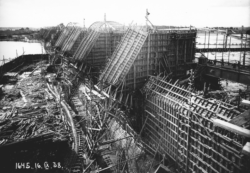Few Americans were as concerned with how to overcome the economic crisis and infrastructural fragmentation of East Central Europe as the US economist Leo Pasvolsky. Apart from his comprehensive studies of the impact of post-war economic disintegration (Economic Nationalism in the Danubian States, 1928; Bulgaria’s Economic Position, 1930), which he authored as part of his … Continue reading “Leo Pasvolsky and Interwar Financial Chaos”
Author: Klaus Richter
Austria, the Nazis, and the Great Depression in Czechoslovakia
Ferdinand Marek is the defining figure in interwar Austrian-Czechoslovak relations, and his writings are invaluable sources to gauge the perspectives of crisis-riddled Austria on the highly industrialised First Czechoslovak Republic. After the disintegration of the Habsburg Empire, Marek was Austria’s first envoy in Prague, where he was charged with the establishment of an Austrian embassy. … Continue reading “Austria, the Nazis, and the Great Depression in Czechoslovakia”
Domestic Servants in 1930s Romania
According to the Encyclopedia of Romania, published in 1938 after years of data collection, domestic servants made up 24.9 percent of the active population of Bucharest in the 1930s. They were the second largest category of employment, after industrial workers (28 percent), but ahead of civil servants and clerks (19.3 percent). This was a significant … Continue reading “Domestic Servants in 1930s Romania”
European Union and European Disintegration
Stemming from an initiative of French Prime Minister Aristide Briand, the Commission of Enquiry for European Union, set up by the League of Nations in September 1930, showcases how the Great Depression turned the mood of European politicians against Eastern Europe. Originally designed to promote a closer entanglement of European national economies and thus secure … Continue reading “European Union and European Disintegration”
Constructing East Central Europe out of the Depression
Across 1930s Europe, governments used work-creation schemes to address the problem of rampant mass unemployment. Most often, these were used to carry out large-scale infrastructural projects. In East Central Europe, these projects also had an important state-building function. All states in this region were either newly created or fundamentally reshaped as a consequence of the … Continue reading “Constructing East Central Europe out of the Depression”
Economic nationalism in today’s East Central Europe
Under the pressures of the Great Depression, the predominantly agricultural states of interwar East Central Europe resorted to economic policies that were particularly protectionist in character. In an era when international relations were increasingly characterised by hostility and territorial revisionism, many feared that economic weakness could easily lead to a loss of sovereignty, if exploited … Continue reading “Economic nationalism in today’s East Central Europe”

